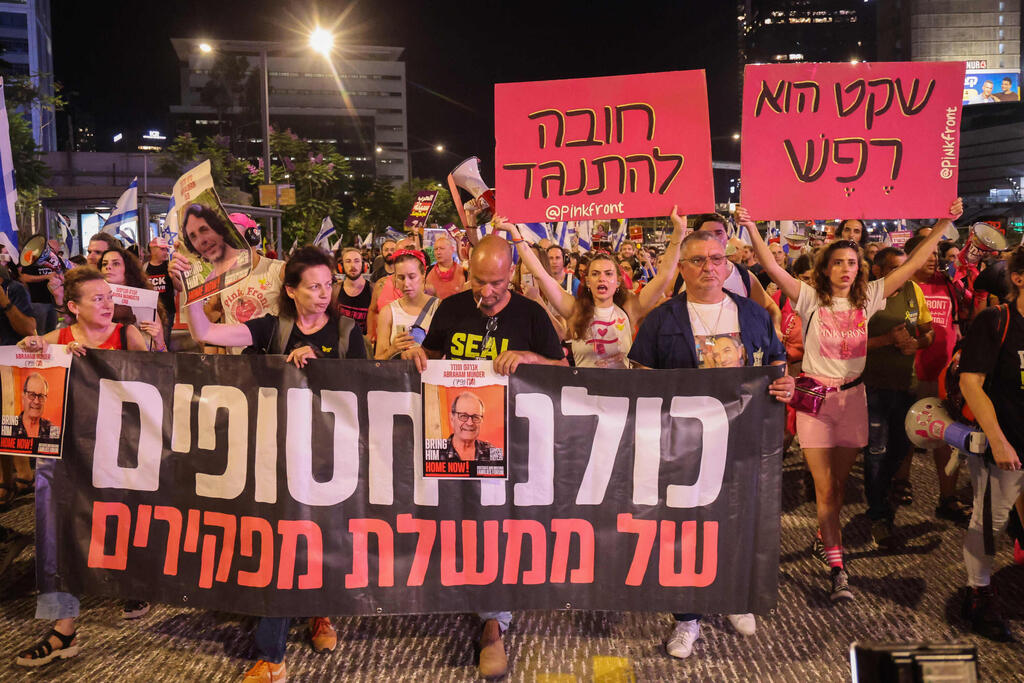Getting your Trinity Audio player ready...
During a recent protest in Tel Aviv, demonstrators held a sign reading "We are all hostages." On the surface, it appears to express solidarity, but in reality, it lacks true empathy.
No, we are not all hostages. There are 115 men, women, children and elderly who were brutally kidnapped from their homes on October 7, and they are the true hostages. Neither the sign-holder nor any other Israeli citizen can understand what it is like to be in Gaza’s tunnels, in a Gazan family's home, fearing rape by a terrorist or living with the existential fear that today might be their last day on Earth.
1 View gallery


Demonstrators holding a sign reading 'We are all hostages' during a protest in Tel Aviv
(Photo: JACK GUEZ / AFP)
This sign is a selfish expression of political stance and motives by exploiting personal and national trauma. What the woman holding the sign really wants to convey is that we are all victims of something. What is that something? Anything she disagrees with, in this case, the government. Because she disapproves of the government, its decisions and policies on all issues, including the hostage deal, are also unacceptable. And the hostages? They are used for political gain.
The argument so far has been that Prime Minister Benjamin Netanyahu's handling of the hostage deal is driven by political motives—a legitimate claim, with some logic, given that every public official has a political motive, and the question is whether it aligns with the national interest. That is for the public to decide.
Regarding the current deal, it does not serve the national interest optimally. First, the hostages: Israel does not know which hostages will be released. Will we get all the female soldiers? The elderly? What about the soldiers? Do you think we’re in a reality show like Big Brother versus The Amazing Race? Wait for Sinwar's reality show—who gets left behind.
And if we give up so much in Phase A, what will we give in Phases B and C? Here, too, the script is predictable: we will get hostages in Phase A, but logic and experience tell us we will not reach Phases B and C. Sinwar will drag out the time and the nerves as only he can.
But Netanyahu also knows that the protests are not really about the deal or the hostages. This is just the same long-standing protest—first, the protests calling to indict Netanyahu, then to oust him, then the anti-judicial reform protests and are now the hostage protests.
From a security perspective, during the cease-fire, the terror organizations in the north and south will use the time to arm themselves and rebuild their forces. Hamas will regain strength in areas where it has lost it and return to regions from which Israel expelled the terrorists. This will make it harder to reach the remaining hostages—thus, the deal, as currently presented, does not meet the national interest in terms of hostage return or security. The only way to maximize the number of hostages we get back and the state's security interests is through increased military pressure and deterrence.
If Netanyahu were driven by political interests, as supporters of the deal claim, and not by national and security interests, he would accept the deal. After all, this is what the protesters, the street burners and the road blockers are demanding—now, now, now. No matter the outcome or which hostages remain behind. If Netanyahu wants peace from the streets, from Defense Minister Yoav Gallant, and from the opposition, he should accept the deal and ignore security considerations and the hostages.
But Netanyahu also knows that the protests are not really about the deal or the hostages. This is just the same long-standing protest—first, the protests calling to indict Netanyahu, then to oust him, then the anti-judicial reform protests and are now the hostage protests.
Sinwar has also learned this and is surely thinking about how he can shape the next protest. The protest of next year, in two years, in ten years. He wants Israel to accept the deal so that we do not achieve a military victory and so that he can keep hostages forever. His goal is to become a political and social actor in Israel without being in Israel. To plunge the country into political turmoil and endless debates. If he could, he would sit and write the signs himself, surrounded by the real hostages, and he would certainly write: "We are all hostages."


